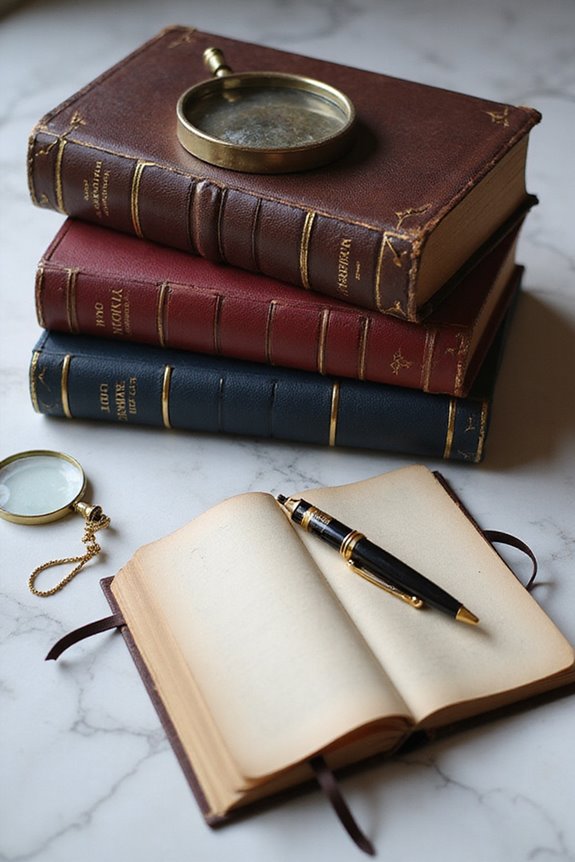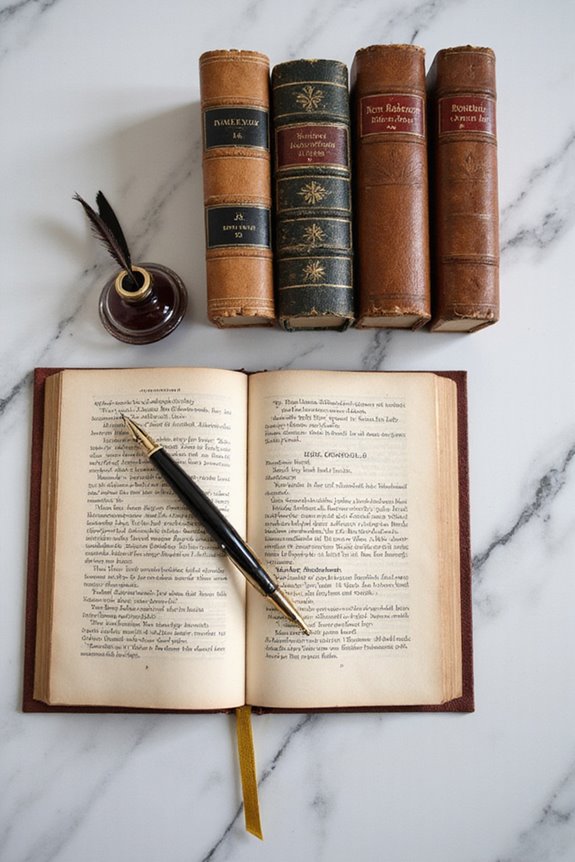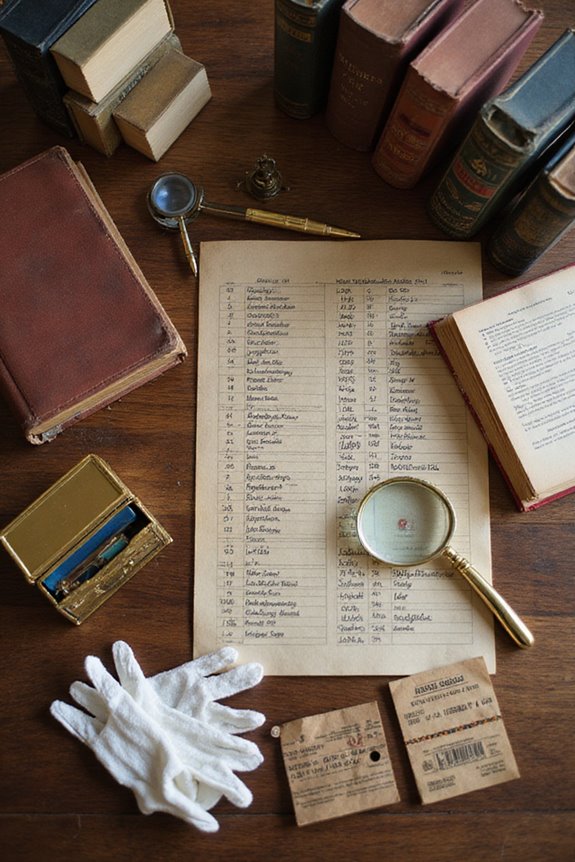If you’re on the hunt for classic books that still resonate today, you can’t go wrong with a few timeless choices. Consider Plato’s *Republic*, which discusses justice, or Shakespeare’s *Hamlet*, diving into ambition and madness. For a twist, Nietzsche’s *The Gay Science* questions traditional morality. These works spark discussions about identity and society. So, if you’re curious about how these classics connect to our lives now, there’s more to explore ahead!
Key Takeaways
- Explore Plato’s *Republic* for insights into justice and the ideal society, a foundational text for philosophical understanding.
- Read Aristotle’s *Metaphysics* to gain a comprehensive view on existence and the nature of reality, essential for philosophical inquiry.
- Enjoy Shakespeare’s plays like “Hamlet” and “Macbeth,” which delve into complex human emotions and timeless themes of ambition and conflict.
- Engage with modernist masterpieces by James Joyce and Virginia Woolf that explore emotional depth and the fragmented nature of reality.
- Consider the *Mahabharata* for its profound reflections on duty and desire, merging epic storytelling with moral explorations relevant to today’s challenges.
Timeless Philosophical Works

When diving into the world of timeless philosophical works, it’s hard not to feel a mix of curiosity and excitement. Think about exploring Plato’s *Republic*, which introduces us to timeless dialogues about justice and ideal societies. Then there’s Aristotle’s *Metaphysics*, laying down the groundwork for how we comprehend existence. If we’re looking for existential inquiries, Nietzsche’s *The Gay Science* dares us to question traditional morality and explore the essence of suffering and truth. And let’s not overlook Heidegger’s *Being and Time*, enriching our grasp of consciousness. These classics aren’t just books; they invite us to engage with deep questions that resonate through history. So, let’s open a chapter and see where our thoughts take us!
Revolutionary Political Treatises

Revolutionary political treatises have shaped our world in profound ways, so let’s plunge into some of the most influential texts that have sparked debates and inspired movements. John Locke’s *Second Treatise of Government* stands out, emphasizing revolutionary ideals like natural rights and government accountability. His influence helped dismantle the divine right of kings, advocating that leaders derive power from the consent of the governed. We should also check out Thomas Paine’s *Common Sense*, which ignited thoughts of independence, or Frederick Douglass’s *Narrative*, which powerfully confronted slavery. Each of these works not only challenged existing norms but also provided frameworks for justice and equality. They’re essential reads for anyone interested in understanding how revolutionary thought continues to shape our society today!
Epic Poetry and Moral Explorations

Epic poetry isn’t just a relic from ancient times; it’s a vibrant art form that continues to resonate with us today. These works tackle moral dilemmas head-on, exploring human nature in ways that are still relevant. For instance, the *Mahabharata* invites us to reflect on duty versus desire, while *The Iliad* showcases the brutal truths of honor and revenge. Through grand narratives and elevated language, epic poetry addresses complex moral questions and human psychology, often leaving us pondering our values. When reading these timeless tales, let’s plunge into the philosophical discussions they present. Don’t shy away from dissecting the emotions of characters; after all, they mirror our own struggles too. So, pick up these classics—let the moral explorations captivate your mind!
Influential Shakespearean Plays

Though Shakespeare wrote centuries ago, his plays still shape our understanding of literature and drama today. Each work is a masterclass in storytelling that can deeply influence our perspectives. For instance, “Romeo and Juliet” is celebrated for its tragic narrative on love and family conflict, while “Hamlet” dives into complex themes of ambition and madness, showcasing Shakespeare’s skill in character development. “Macbeth” further explores ambition’s dark side, creating countless Shakespearean adaptations that keep its themes relevant. Don’t overlook “A Midsummer Night’s Dream,” with its comedy and magic that galore many theatrical works! If you’re keen to appreciate literary history, consider reading these plays—experiencing Shakespeare’s genius firsthand is a timeless opportunity not to be missed.
Modernist Masterpieces

Exploring modernist masterpieces is like revealing a treasure chest filled with unique narrative gems. These works often utilize *stream of consciousness* to mimic natural thought, immersing us directly into characters’ psyches. With *fragmented narratives* and *non-linear time*, we’ll jump around timelines, making connections like a puzzle. Expect *unreliable narrators* that leave you questioning what’s real—just like life! Additionally, many pieces embrace *abstract symbolism* and *experimental language*, pushing boundaries and inviting diverse interpretations. Authors like James Joyce and Virginia Woolf invite us to reflect on themes of *psychological isolation* and steadily critique capitalism’s influence on society. So, crack open a classic and plunge into this whirlwind of emotional complexity and artistic innovation—it’s like a literary rollercoaster!
Historical Fiction Insights
When we immerse ourselves in historical fiction, we often find ourselves not just reading about the past, but actually experiencing it. These stories, like *The Nightingale* or *Gates of Fire*, not only captivate us with thrilling plots, but also provide historical accuracy that enriches our understanding of significant events and figures. We witness amazing character development, as authors create complex protagonists facing the challenges of their time, whether in war-torn France or ancient Greece. So, as we explore these narratives, let’s savor the lessons hidden in the pages, learning about societal structures and personal sacrifice. Plus, they make history feel relatable! We encourage you to plunge into these engaging reads for both fun and learning! These novels often showcase rich character development which enhances the emotional journeys of the characters.
Psychological Depth in Literature
Let’s not forget *The Bell Jar*, where Esther’s struggles with identity highlight mental illness. We can also appreciate how existential themes are evident in *The Stranger*, tackling alienation, or *Hamlet*, with its indecision and psychological turmoil. As we explore these classics, we not only understand characters better but also reflect on our humanity. So grab a book and let’s begin this mental journey!
Gothic and Dark Romanticism
Gothic and Dark Romanticism beckons us into a world where shadows linger and secrets abound, often challenging our perceptions of reality. Think of those eerie Gothic settings—castles and mansions filled with mysteries. We encounter psychological themes that explore the depths of fear and madness, making us question the line between sanity and instability. Supernatural elements add that delightful chill, with ghosts, monsters, and madness lurking in every corner. A perfect example is Mary Shelley’s *Frankenstein*, which explores creation and monstrosity. Then there’s Edgar Allan Poe’s *The Tell-Tale Heart*, where psychological tension grips readers. As we navigate these tales, we’ll
Social Satire and Critique
Although we might not always realize it, social satire plays an essential role in shaping our understanding of the world around us. Classic works like “Candide” by Voltaire and “Catch-22” by Joseph Heller employ clever satirical techniques to highlight absurdities in society and politics. These authors don’t just entertain; they engage in cultural critique, urging us to think critically about our own lives. For instance, “Pride and Prejudice” reveals the pitfalls of class structure with wit, while “Animal Farm” uses allegory to comment on political systems. As you explore these novels, reflect on how their insights relate to today’s issues. Reading these classics can deepen our awareness and spark conversations about the world we live in.
Rediscovering Coming-of-Age Classics
When we think about coming-of-age stories, it’s clear they resonate deeply with our own experiences, often reflecting the trials and tribulations of adolescence. We can find nostalgic reflections in classics like *The Catcher in the Rye*, where Holden Caulfield’s struggles illuminate our own feelings of alienation. Harper Lee’s *To Kill a Mockingbird* teaches us about moral courage during turbulent times, while *A Kestrel for a Knave* offers insight into trauma and friendship amid class struggles. Jeanette Winterson’s *Oranges Are Not the Only Fruit* presents identity conflicts that many still face today. As we rediscover these literary gems, we engage in emotional growth, creating connections between our lives and the characters’ journeys. So, let’s plunge into!
Frequently Asked Questions
How Do Classics Compare to Contemporary Literature in Themes?
As we journey through literature’s landscape, timeless themes weave through classics like golden threads. While contemporary works reflect our current struggles, both showcase literary evolution, enriching our understanding of the human experience across generations.
What Are the Most Accessible Classic Books for New Readers?
When it comes to accessible classics for beginner readers, we often find gems like *The Little Prince* and *Animal Farm*. Their simple language and engaging stories make diving into classic literature enjoyable and approachable for everyone.
Do Classic Books Have Adaptations in Modern Media?
Haven’t we all noticed the surge in classic book adaptations lately? We see adaptation trends flourishing, bringing modern interpretations of timeless tales to life, enchanting new audiences and sparking fresh conversations about these enduring stories.
How Can I Effectively Approach Reading Challenging Classics?
When tackling challenging classics, we’ve found that effective reading strategies, like researching context and joining book clubs, really help us overcome obstacles. Let’s engage with the text together for a richer experience!
What Are the Benefits of Reading Classics for Personal Growth?
Reading classics isn’t just beneficial; it’s like releasing a mental superhero! We gain intellectual stimulation and emotional resonance, transforming our perspectives while steering through life’s complexities with newfound wisdom, empathy, and creativity beyond imagination.





